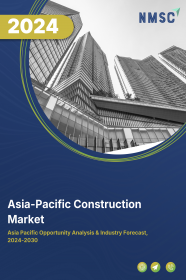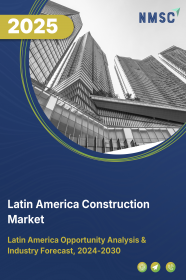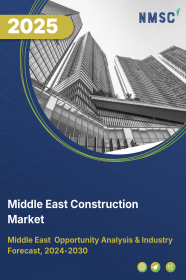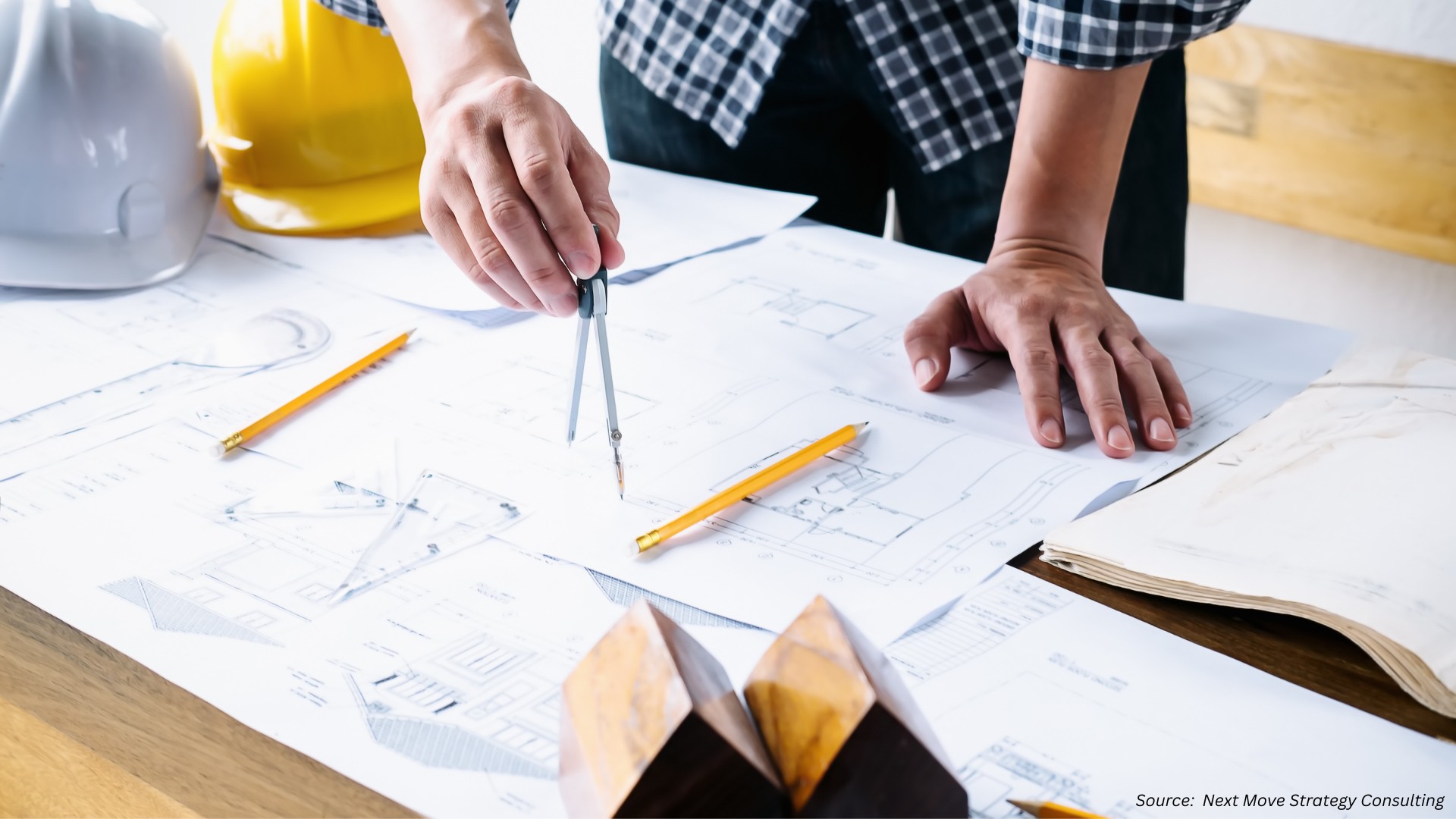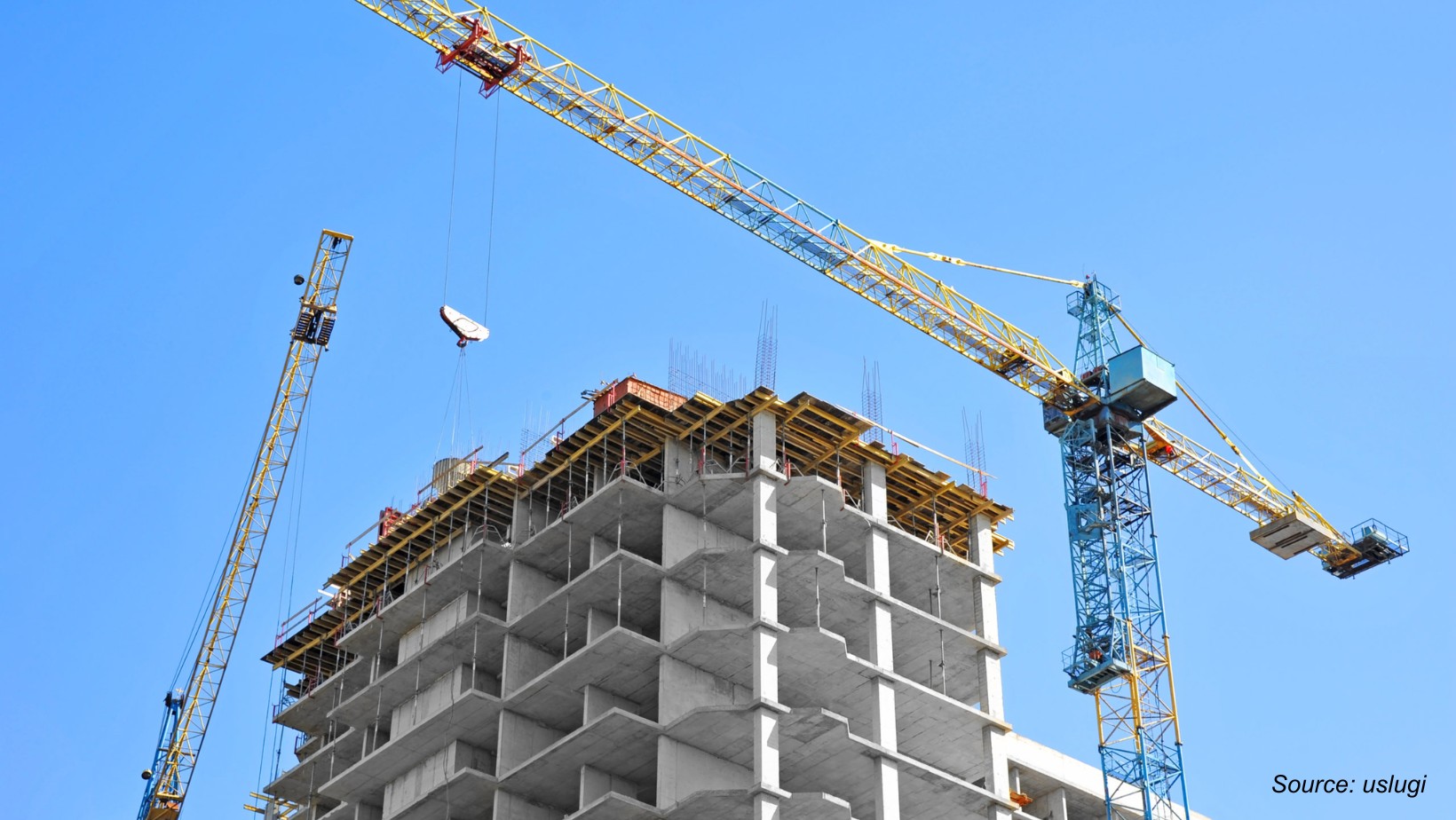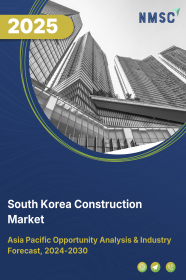
South Korea Construction Market by Type (Renovation, and New Construction), by Sector (Real Estate, Infrastructure, and Industrial), by Construction Method (Traditional Construction, Prefabricated/Modular Construction, 3D Printed Construction, and Green/Sustainable Construction), by Type of Contractor (Small Contractor, Medium Contractor, and Large Contractor)– Industry Trends and Forecast, 2025–2030.
Industry: Construction & Manufacturing | Publish Date: 06-Sep-2025 | No of Pages: 87 | No. of Tables: 117 | No. of Figures: 62 | Format: PDF | Report Code : CM2219
South Korea Construction Industry Overview
The South Korea Construction Market size was valued at USD 325.91 billion in 2024, and is projected to grow to USD 343.37 billion by 2025. Additionally, the industry is expected to continue its growth trajectory, reaching USD 389.89 billion by 2030, with a CAGR of 2.6% from 2025 to 2030.
The market is experiencing significant growth driven by major large-scale projects such as the Samsung Electronics semiconductor cluster, Incheon Airport Terminal expansion, and the Seoul Yeouido International Finance Center redevelopment, all of which aim to enhance the country's global infrastructure and economic position.
The surge in infrastructure investments, particularly in energy and transport sectors, is further fueling market expansion, while government support ensures continued development.
However, the market faces challenges due to regulatory complexities, including lengthy permit processes and bureaucratic inefficiencies, which can delay projects and increase costs.
Despite these obstacles, the growing adoption of digital technologies like Building Information Modeling (BIM), along with AI and IoT integration, offers significant opportunities for improved project management, efficiency, and collaboration, driving further growth in the sector.
Large-Scale Projects Drive South Korea Construction Market Growth
The South Korea construction industry is gaining strong momentum, supported by a wave of large-scale projects shaping the nation’s economic and industrial future. Mega investments in high-tech manufacturing, financial districts, and transport infrastructure are strengthening the country’s position as a global hub for innovation and commerce. These projects are not only expanding capacity in key industries but are also creating demand across residential, commercial, and service-linked construction segments.
Such initiatives highlight the government’s commitment to fostering industrial competitiveness and urban renewal. Backed by strategic policies, these developments are expected to deliver long-term benefits, including job creation, enhanced productivity, and regional development. Large-scale project pipelines remain central to driving demand and will continue to act as a cornerstone for sustained market expansion.
Rising Infrastructure Investments Propel Market Demand
Investment in infrastructure remains a critical growth driver for the South Korea construction market. Public spending allocations for transport, energy, and digital connectivity have increased steadily, reinforcing the country’s resilience and supporting modernization goals. Energy transition projects, transport network expansions, and smart-city initiatives are particularly influential in generating robust construction activity.
These investments are closely aligned with national strategies to strengthen competitiveness and achieve sustainability goals. Rising capital allocation for renewable energy, mobility infrastructure, and digital networks ensures a steady flow of opportunities for contractors and developers. With infrastructure viewed as an economic stabilizer, continued investment will underpin both short-term demand and long-term structural growth.
Regulatory Complexities Challenge Market Expansion
While growth prospects are strong, regulatory hurdles remain a persistent challenge for the South Korea construction sector. Projects often face delays due to multi-layered approval processes involving zoning, environmental reviews, and safety compliance. This complexity can slow down project execution, escalate costs, and create uncertainty for investors and developers.
Policy shifts and regional disparities further complicate the regulatory landscape. Sudden adjustments in building codes, environmental standards, or urban planning guidelines may disrupt timelines and reduce investor confidence. Addressing these inefficiencies through streamlined processes and harmonized regulations is essential for maintaining market momentum and unlocking greater private-sector participation.
Digitalization and BIM Adoption Unlock Opportunities
The construction market in South Korea is undergoing a digital transformation, with rapid adoption of Building Information Modeling (BIM) and cloud-based project management. These tools enhance design accuracy, reduce waste, and improve collaboration among stakeholders, making them indispensable in large-scale and complex projects. BIM adoption is increasingly supported by both regulatory mandates and industry demand for efficient delivery.
Beyond BIM, the integration of artificial intelligence, Internet of Things, and automation is driving innovation across the sector. Real-time data analytics, predictive maintenance, and digital twin technologies are enabling smarter infrastructure and optimized facility management. As digitalization becomes embedded in project lifecycles, it presents a significant opportunity to boost efficiency, sustainability, and long-term value creation in South Korea’s construction market.
Competitive Landscape
The key players operating in the South Korea construction industry include Hyundai Engineering & Construction Co., Ltd., Samsung C&T Corporation (E&C Group), GS Engineering & Construction Corp., DL E&C Co., Ltd., Daewoo Engineering & Construction Co., Ltd., POSCO E&C Co., Ltd., Lotte Engineering & Construction Co., Ltd., HD Hyundai Engineering Co., Ltd., Hanwha Corporation E&C Division, SK ecoplant Co., Ltd., Doosan Engineering & Construction Co., Ltd., Kyeryong Construction Industrial Co., Ltd., Hoban Construction Co., Ltd., Samsung Engineering Co., Ltd. Daelim Industrial Co., Ltd. (DL Group, Construction Arm), and others.
South Korea Construction Market Key Segments
By Type
-
Renovation
-
New Construction
By Sector
-
Real Estate
-
Residential
-
Affordable
-
Luxury
-
-
Commercial
-
Retail Buildings
-
Office Buildings
-
Hospitality
-
Healthcare Facilities
-
Educational Institutes
-
Entertainment Ventures
-
-
-
Infrastructure
-
Transportation
-
Airport
-
Port
-
Rail
-
Road
-
-
Water and Wastewater
-
Energy
-
Telecommunication
-
-
Industrial
-
Manufacturing Plant
-
Warehouses
-
Power Plants
-
Oil Refineries
-
Chemical Plants
-
By Construction Method
-
Traditional Construction
-
Prefabricated/Modular Construction
-
3D Printed Construction
-
Green/Sustainable Construction
By Type of Contractor
-
Small Contractor
-
Medium Contractor
-
Large Contractor
Key Players
-
Hyundai Engineering & Construction Co., Ltd.
-
Samsung C&T Corporation (E&C Group)
-
GS Engineering & Construction Corp.
-
DL E&C Co., Ltd.
-
Daewoo Engineering & Construction Co., Ltd.
-
POSCO E&C Co., Ltd.
-
Lotte Engineering & Construction Co., Ltd.
-
HD Hyundai Engineering Co., Ltd.
-
Hanwha Corporation E&C Division
-
SK ecoplant Co., Ltd.
-
Doosan Engineering & Construction Co., Ltd.
-
Kyeryong Construction Industrial Co., Ltd.
-
Hoban Construction Co., Ltd.
-
Samsung Engineering Co., Ltd.
-
Daelim Industrial Co., Ltd. (DL Group, Construction Arm)
REPORT SCOPE AND SEGMENTATION:
|
Parameters |
Details |
|
Market Size in 2024 |
USD 325.91 Billion |
|
Revenue Forecast in 2030 |
USD 389.89 Billion |
|
Growth Rate |
CAGR of 2.6% from 2025 to 2030 |
|
Analysis Period |
2024–2030 |
|
Base Year Considered |
2024 |
|
Forecast Period |
2025–2030 |
|
Market Size Estimation |
Billion (USD) |
|
Growth Factors |
|
|
Companies Profiled |
15 |
|
Market Share |
Available for 10 companies |
|
Customization Scope |
Free customization (equivalent up to 80 working hours of analysts) after purchase. Addition or alteration to country, regional, and segment scope. |
|
Pricing and Purchase Options |
Avail customized purchase options to meet your exact research needs. |

















 Speak to Our Analyst
Speak to Our Analyst



